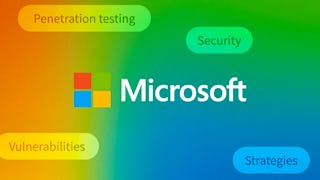- Browse
- Cybersecurity
Cybersecurity Courses
Cybersecurity courses can help you learn network security, risk management, encryption techniques, and incident response strategies. You can build skills in threat analysis, vulnerability assessment, and implementing security protocols to protect sensitive information. Many courses introduce tools like firewalls, intrusion detection systems, and security information and event management (SIEM) software, showing how these tools support the skills needed to safeguard digital environments.
Popular Cybersecurity Courses and Certifications
 Status: Free TrialFree TrialG
Status: Free TrialFree TrialGGoogle
Skills you'll gain: Cybersecurity, Security Controls, Information Systems Security Assessment Framework (ISSAF), Computer Security, Security Strategy, Cyber Risk, Security Information and Event Management (SIEM), Data Ethics, Network Analysis, Personally Identifiable Information, Ethical Standards And Conduct
Build toward a degree
4.8·Rating, 4.8 out of 5 stars40K reviewsBeginner · Course · 1 - 4 Weeks
 Status: Free TrialFree TrialStatus: AI skillsAI skillsG
Status: Free TrialFree TrialStatus: AI skillsAI skillsGGoogle
Skills you'll gain: Threat Modeling, Network Security, Threat Management, Vulnerability Management, Intrusion Detection and Prevention, Hardening, Computer Security Incident Management, Security Management, Cyber Threat Intelligence, Cyber Attacks, Incident Response, Cybersecurity, Network Protocols, Threat Detection, Bash (Scripting Language), Debugging, Linux, Interviewing Skills, Python Programming, SQL
Build toward a degree
4.8·Rating, 4.8 out of 5 stars63K reviewsBeginner · Professional Certificate · 3 - 6 Months
 Status: Free TrialFree Trial
Status: Free TrialFree TrialSkills you'll gain: Cybersecurity, Cyber Attacks, Data Security, Computer Security Awareness Training, Authentications, Authorization (Computing), Application Security, Security Controls, Personally Identifiable Information, Security Awareness, Identity and Access Management, Information Privacy, Cryptography, Malware Protection, Hardening, Encryption, Vulnerability Assessments, Multi-Factor Authentication, Data Integrity
4.8·Rating, 4.8 out of 5 stars1.1K reviewsBeginner · Course · 1 - 4 Weeks
 Status: Free TrialFree TrialStatus: AI skillsAI skillsM
Status: Free TrialFree TrialStatus: AI skillsAI skillsMMicrosoft
Skills you'll gain: Threat Modeling, MITRE ATT&CK Framework, Penetration Testing, Azure Active Directory, Network Security, Computer Systems, Security Information and Event Management (SIEM), Security Testing, Encryption, Cybersecurity, System Testing, Cloud Security, Threat Management, Vulnerability Scanning, Cloud Computing, Authentications, Active Directory, Operating Systems, Data Management, Computer Security Incident Management
4.7·Rating, 4.7 out of 5 stars2.9K reviewsBeginner · Professional Certificate · 3 - 6 Months
 Status: Free TrialFree Trial
Status: Free TrialFree TrialSkills you'll gain: Malware Protection, Identity and Access Management, Incident Response, Cybersecurity, Computer Security Incident Management, Network Security, Threat Management, Threat Detection, Cyber Attacks, Authentications, Distributed Denial-Of-Service (DDoS) Attacks, Security Awareness, Digital Forensics, Security Controls, Multi-Factor Authentication, Human Factors (Security)
4.6·Rating, 4.6 out of 5 stars16K reviewsBeginner · Course · 1 - 3 Months
 Status: Free TrialFree Trial
Status: Free TrialFree TrialSkills you'll gain: Network Security, Incident Response, Business Continuity, Disaster Recovery, Security Controls, Configuration Management, Governance, Cybersecurity, Security Management, Computer Security Incident Management, Cyber Attacks, Computer Security Awareness Training, Information Assurance, Data Security, Infrastructure Security, Risk Management Framework, Event Monitoring, Encryption, Role-Based Access Control (RBAC), Authorization (Computing)
4.7·Rating, 4.7 out of 5 stars1.2K reviewsBeginner · Specialization · 3 - 6 Months
What brings you to Coursera today?
 Status: Free TrialFree TrialU
Status: Free TrialFree TrialUUniversity of Maryland, College Park
Skills you'll gain: Cyber Risk, Cyber Security Policies, Security Management, Cybersecurity, Risk Management, Cyber Security Strategy, Cyber Attacks, Threat Modeling, Telecommunications, Computer Security Awareness Training, Enterprise Security, General Networking, Exploitation techniques, Public Safety and National Security, Exploit development, Governance, Political Sciences
4.7·Rating, 4.7 out of 5 stars3.2K reviewsBeginner · Course · 1 - 3 Months
 Status: NewNewStatus: Free TrialFree TrialU
Status: NewNewStatus: Free TrialFree TrialUUniversity of Maryland, College Park
Skills you'll gain: Cybersecurity, Cyber Security Policies, Cyber Risk, Cyber Attacks, Cyber Governance, Cyber Security Strategy, Security Management, Infrastructure Security, Data Security, Threat Modeling, Computer Security, Security Awareness, Risk Management, Enterprise Security, Vulnerability, Governance, General Networking, Public Safety and National Security, Threat Detection, Artificial Intelligence
4.7·Rating, 4.7 out of 5 stars3.3K reviewsBeginner · Specialization · 3 - 6 Months
 Status: Free TrialFree TrialC
Status: Free TrialFree TrialCCisco Learning and Certifications
Skills you'll gain: MITRE ATT&CK Framework, Incident Response, Cyber Threat Intelligence, Cyber Threat Hunting, Key Management, Data Security, Threat Modeling, Computer Security Incident Management, File Systems, Endpoint Security, Cryptography, Network Security, Distributed Denial-Of-Service (DDoS) Attacks, Linux, Malware Protection, Operating System Administration, Vulnerability Assessments, Threat Detection, Cybersecurity, Workflow Management
4.8·Rating, 4.8 out of 5 stars1.2K reviewsBeginner · Specialization · 3 - 6 Months
 Status: Free TrialFree TrialStatus: AI skillsAI skills
Status: Free TrialFree TrialStatus: AI skillsAI skillsSkills you'll gain: Operating System Administration, Digital Forensics, Cyber Threat Hunting, Incident Response, IT Service Management, Identity and Access Management, Cloud Computing, Governance Risk Management and Compliance, Information Technology Infrastructure Library, Endpoint Security, Malware Protection, Penetration Testing, Computer Security Incident Management, Linux Commands, Database Management, Networking Hardware, Cybersecurity, Cyber Threat Intelligence, Interviewing Skills, Cyber Security Assessment
Build toward a degree
4.6·Rating, 4.6 out of 5 stars27K reviewsBeginner · Professional Certificate · 3 - 6 Months
 Status: Free TrialFree Trial
Status: Free TrialFree TrialSkills you'll gain: Identity and Access Management, Endpoint Security, Network Security, Cybersecurity, Threat Detection, Cyber Attacks, Data Security, Cyber Security Strategy, Secure Coding, Firewall, Application Security, Authentications, Infrastructure Security, Security Controls, Authorization (Computing), Security Information and Event Management (SIEM), Data Governance, Security Testing, Virtual Private Networks (VPN)
4.8·Rating, 4.8 out of 5 stars176 reviewsIntermediate · Course · 1 - 3 Months
 Status: Free TrialFree Trial
Status: Free TrialFree TrialSkills you'll gain: Debugging, Python Programming, Cybersecurity, Scripting, Programming Principles, IT Automation, Algorithms, Automation, Computer Programming, File Management, Data Structures
4.8·Rating, 4.8 out of 5 stars3.5K reviewsBeginner · Course · 1 - 4 Weeks
In summary, here are 10 of our most popular cybersecurity courses
- Foundations of Cybersecurity: Google
- Google Cybersecurity: Google
- Introduction to Cybersecurity Essentials: IBM
- Microsoft Cybersecurity Analyst: Microsoft
- Introduction to Cybersecurity Tools & Cyberattacks: IBM
- Certified in Cybersecurity: ISC2
- Cybersecurity for Everyone: University of Maryland, College Park
- Cybersecurity in the AI Era: University of Maryland, College Park
- Cybersecurity Operations Fundamentals: Cisco Learning and Certifications
- IBM Cybersecurity Analyst: IBM
Skills you can learn in Computer Security And Networks
Frequently Asked Questions about Cybersecurity
Cybersecurity is the practice of protecting systems, networks, and programs from digital attacks. These cyber threats can lead to unauthorized access to sensitive information, data breaches, and significant financial losses. In today's increasingly digital world, cybersecurity is crucial for safeguarding personal data, maintaining privacy, and ensuring the integrity of information systems. As cyber threats evolve, the importance of cybersecurity continues to grow, making it a vital field for individuals and organizations alike.
A career in cybersecurity can lead to various roles, including cybersecurity analyst, security engineer, penetration tester, and information security manager. These positions involve protecting an organization's information systems, identifying vulnerabilities, and responding to security incidents. With the increasing demand for cybersecurity professionals, there are ample opportunities for growth and advancement in this field
To succeed in cybersecurity, you need a mix of technical and soft skills. Key technical skills include knowledge of network security, cryptography, risk assessment, and incident response. Familiarity with programming languages, such as Python or Java, can also be beneficial. Additionally, soft skills like problem-solving, analytical thinking, and effective communication are essential for collaborating with teams and conveying security concepts to non-technical stakeholders.
There are many online courses available to help you learn about cybersecurity. Some of the best options include the Google Cybersecurity Professional Certificate and the IBM Cybersecurity Analyst Professional Certificate. These programs provide comprehensive training and practical skills that can help you start or advance your career in cybersecurity.
Yes. You can start learning cybersecurity on Coursera for free in two ways:
- Preview the first module of many cybersecurity courses at no cost. This includes video lessons, readings, graded assignments, and Coursera Coach (where available).
- Start a 7-day free trial for Specializations or Coursera Plus. This gives you full access to all course content across eligible programs within the timeframe of your trial.
If you want to keep learning, earn a certificate in cybersecurity, or unlock full course access after the preview or trial, you can upgrade or apply for financial aid.
To learn cybersecurity, start by exploring online courses that cover fundamental concepts and skills. Engage with hands-on projects and labs to apply what you learn in real-world scenarios. Additionally, consider joining cybersecurity communities or forums to connect with professionals and gain insights. Consistent practice and staying updated with the latest trends and threats are also crucial for your learning journey.
Cybersecurity courses typically cover a range of topics, including network security, threat analysis, ethical hacking, and compliance regulations. You may also learn about specific tools and technologies used in the field, such as firewalls, intrusion detection systems, and encryption methods. Understanding these topics will provide a solid foundation for a career in cybersecurity.
For training and upskilling employees in cybersecurity, programs like the Palo Alto Networks Cybersecurity Professional Certificate and the Microsoft Cybersecurity Analyst Professional Certificate are excellent choices. These courses are designed to equip individuals with the necessary skills to protect their organizations from cyber threats effectively.










